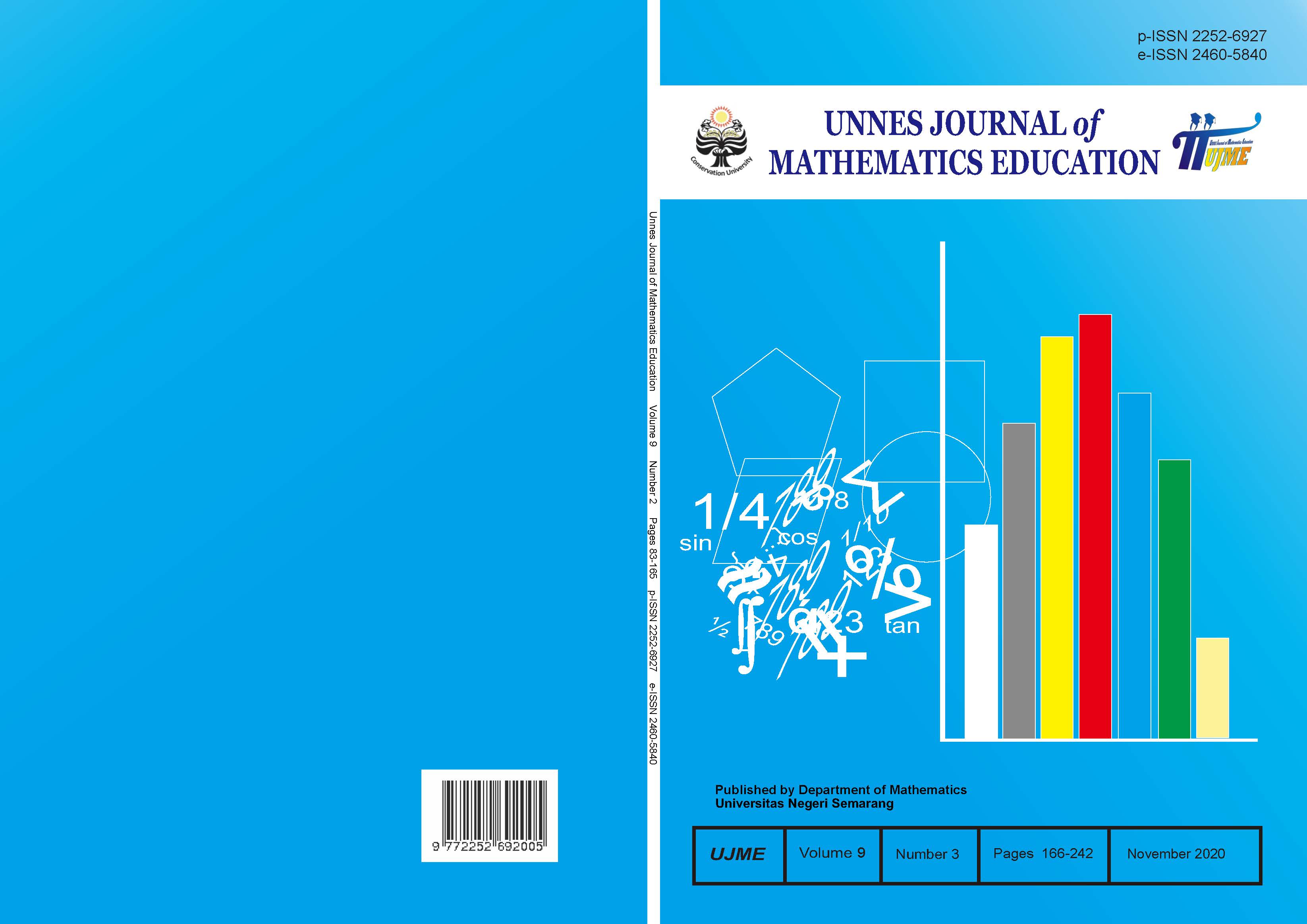The development of problem sheets based on model eliciting activities learning to improve students’ mathematical communication ability
##plugins.themes.academic_pro.article.main##
Abstract
Problem Sheets are another form of the student worksheet that is arranged specifically in the Model Eliciting Activities (MEAs) learning. Students have to solve some problems in Problem Sheets with mathematical modeling. The purpose of this research was to produce a Problem Sheets based on MEAs learning which was guided by the indicators of students’ mathematical communication ability. This research is a type of Research and Development (R&D), the model used in this research is 4D Models consisting of 1) Define; 2) Design; 3) Develop; and 4) Disseminate. However, this research only went through three steps, they are 1) Define; 2) Design; and 3) Develop. The feasibility test result shows the Problem Sheets feasible is used in activities learning with a percentage of In addition, the readability test uses Cochran Test result shows that It means the students have the same understanding of the Problem Sheets given. After getting e-copyrights from the Directorate General of the Intellectual Property, the Problem Sheets based on MEAs learning is ready used for the next steps, that is testing in classroom learning.
##plugins.themes.academic_pro.article.details##
References
Akbar, S. (2013). Instrumen Perangkat Pembelajaran. Bandung: PT Remaja Rosdakarya.
BSNP. (2017). Standar Buku Ajar dan Modul. Jakarta: Ristekdikti
Dewi, N. R. & Arini, F. Y. (2018) Uji Keterb acaan pada Pengembangan Buku Ajar Kalkulus Berbantuan Geogebra untuk Meningkatkan Kemampuan Pemecahan Masalah dan Representasi Matematis. (Readability Test in Developing Calculus Textbooks Assisted by GeoGebra to Improve Problem Solving and Mathematical Representation Ability). Prisma 1. Page 299-303. Available at https:// journal.unnes.ac.id/sju/index.php/prisma/ [Accessed on 12-06-2020]
Djarwanto. (2003). Statistik Non Parametrik. Yogyakarta: BPFE.
Hendriana, H., Rohaeti, E. E., & Sumarmo, U. (2017). Hard Skills and Soft Skills. Bandung: Refika Aditama.
Ismail. (2014). Efektifitas Model Pembelajaran Berbasis Masalah Menggunakan LKS (Lembar Kerja Siswa) dengan Tehnik Jigsaw Terhadap Motivasi dan Hasil Belajar Siswa SMA. (The Effectiveness of Problem-Based Learning Models using Student worksheets with Jigsaw Techniques on Senior High School Students Motivation and Learning Outcomes). (Master’s thesis). Universitas Terbuka.
Putra, R. M. S. (2013). Fog Index dan Keterbacaan Berita Utama (Headline) Suara Merdeka 03 Mei 2013. (Fog Index and Readability of Suara Merdeka Headlines on Mei, 02, 2013). Jurnal Ilmu Komunikasi, 10(1): 41-48. Available at: https://www.researchgate.net/ [Accessed on 2-08-2020]
Sudijono. (2009). Pengantar Statistik Pendidikan. Jakarta: Grafindo Persada.
Trianto. (2017). Mendesain Model Pembelajaran Inovatiif, Progresif, dan Kontekstual. Jakarta: Kencana .
Zulkarnain, I. (2013). Kemampuan Pemahaman dan Komunikasi Matematis Siswa dalam Pembelajaran Kooperatif Berbasis Konflik Kognitif. (Students’ Mathematical Communication and Understanding Abilities in Cooperative Learning Based on Cognitive Conflict). (Doctoral Dissertation). Universitas Pendidikan Indonesia, Bandung.
